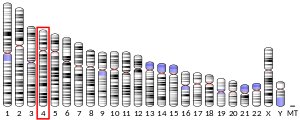ANAPC4
Anaphase-promoting complex subunit 4 is an enzyme that in humans is encoded by the ANAPC4 gene.[4][5]
A large protein complex, termed the anaphase-promoting complex (APC), or the cyclosome, promotes metaphase-anaphase transition by ubiquitinating its specific substrates such as mitotic cyclins and anaphase inhibitor, which are subsequently degraded by the 26S proteasome. Biochemical studies have shown that the vertebrate APC contains eight subunits. The composition of the APC is highly conserved in organisms from yeast to humans. The exact function of this gene product is not known.[5]
Interactions
ANAPC4 has been shown to interact with ANAPC1,[6][7] ANAPC5,[6] CDC27[6][8] and ANAPC7.[6]
gollark: Actually, common sense is sold by GTech™ at the low cost of £2.81/μs.
gollark: Good job imagining!
gollark: Please imagine rapidly. We don't have much time.
gollark: Imagine having age and gender.
gollark: Why?
References
- GRCh38: Ensembl release 89: ENSG00000053900 - Ensembl, May 2017
- "Human PubMed Reference:". National Center for Biotechnology Information, U.S. National Library of Medicine.
- "Mouse PubMed Reference:". National Center for Biotechnology Information, U.S. National Library of Medicine.
- Tekolf WA, Biddison WE, Aster RD, Shaw S (October 1982). "Two subgroups of HLA Bw44 defined by cell-mediated lympholysis that differ in Bw44 expression on platelets and in patterns of genetic linkage disequilibrium". J Immunol. 129 (4): 1474–8. PMID 6180011.
- "Entrez Gene: ANAPC4 anaphase promoting complex subunit 4".
- Vodermaier, Hartmut C; Gieffers, Christian; Maurer-Stroh, Sebastian; Eisenhaber, Frank; Peters, Jan-Michael (September 2003). "TPR subunits of the anaphase-promoting complex mediate binding to the activator protein CDH1". Curr. Biol. 13 (17): 1459–68. doi:10.1016/S0960-9822(03)00581-5. ISSN 0960-9822. PMID 12956947.
- Sumara, I; Vorlaufer E; Gieffers C; Peters B H; Peters J M (November 2000). "Characterization of vertebrate cohesin complexes and their regulation in prophase". J. Cell Biol. 151 (4): 749–62. doi:10.1083/jcb.151.4.749. ISSN 0021-9525. PMC 2169443. PMID 11076961.
- Gmachl, M; Gieffers C; Podtelejnikov A V; Mann M; Peters J M (August 2000). "The RING-H2 finger protein APC11 and the E2 enzyme UBC4 are sufficient to ubiquitinate substrates of the anaphase-promoting complex". Proc. Natl. Acad. Sci. U.S.A. 97 (16): 8973–8. Bibcode:2000PNAS...97.8973G. doi:10.1073/pnas.97.16.8973. ISSN 0027-8424. PMC 16806. PMID 10922056.
External links
- Human ANAPC4 genome location and ANAPC4 gene details page in the UCSC Genome Browser.
Further reading
- Bonaldo MF, Lennon G, Soares MB (1997). "Normalization and subtraction: two approaches to facilitate gene discovery". Genome Res. 6 (9): 791–806. doi:10.1101/gr.6.9.791. PMID 8889548.
- Yu H, Peters JM, King RW, et al. (1998). "Identification of a cullin homology region in a subunit of the anaphase-promoting complex". Science. 279 (5354): 1219–22. Bibcode:1998Sci...279.1219Y. doi:10.1126/science.279.5354.1219. PMID 9469815.
- Grossberger R, Gieffers C, Zachariae W, et al. (1999). "Characterization of the DOC1/APC10 subunit of the yeast and the human anaphase-promoting complex". J. Biol. Chem. 274 (20): 14500–7. doi:10.1074/jbc.274.20.14500. PMID 10318877.
- Gieffers C, Peters BH, Kramer ER, et al. (1999). "Expression of the CDH1-associated form of the anaphase-promoting complex in postmitotic neurons". Proc. Natl. Acad. Sci. U.S.A. 96 (20): 11317–22. Bibcode:1999PNAS...9611317G. doi:10.1073/pnas.96.20.11317. PMC 18031. PMID 10500174.
- Gmachl M, Gieffers C, Podtelejnikov AV, et al. (2000). "The RING-H2 finger protein APC11 and the E2 enzyme UBC4 are sufficient to ubiquitinate substrates of the anaphase-promoting complex". Proc. Natl. Acad. Sci. U.S.A. 97 (16): 8973–8. Bibcode:2000PNAS...97.8973G. doi:10.1073/pnas.97.16.8973. PMC 16806. PMID 10922056.
- Strausberg RL, Feingold EA, Grouse LH, et al. (2003). "Generation and initial analysis of more than 15,000 full-length human and mouse cDNA sequences". Proc. Natl. Acad. Sci. U.S.A. 99 (26): 16899–903. Bibcode:2002PNAS...9916899M. doi:10.1073/pnas.242603899. PMC 139241. PMID 12477932.
- Vodermaier HC, Gieffers C, Maurer-Stroh S, et al. (2004). "TPR subunits of the anaphase-promoting complex mediate binding to the activator protein CDH1". Curr. Biol. 13 (17): 1459–68. doi:10.1016/S0960-9822(03)00581-5. PMID 12956947.
- Kraft C, Herzog F, Gieffers C, et al. (2004). "Mitotic regulation of the human anaphase-promoting complex by phosphorylation". EMBO J. 22 (24): 6598–609. doi:10.1093/emboj/cdg627. PMC 291822. PMID 14657031.
- Johnson JM, Castle J, Garrett-Engele P, et al. (2004). "Genome-wide survey of human alternative pre-mRNA splicing with exon junction microarrays". Science. 302 (5653): 2141–4. Bibcode:2003Sci...302.2141J. doi:10.1126/science.1090100. PMID 14684825.
- Ota T, Suzuki Y, Nishikawa T, et al. (2004). "Complete sequencing and characterization of 21,243 full-length human cDNAs". Nat. Genet. 36 (1): 40–5. doi:10.1038/ng1285. PMID 14702039.
This article is issued from Wikipedia. The text is licensed under Creative Commons - Attribution - Sharealike. Additional terms may apply for the media files.

